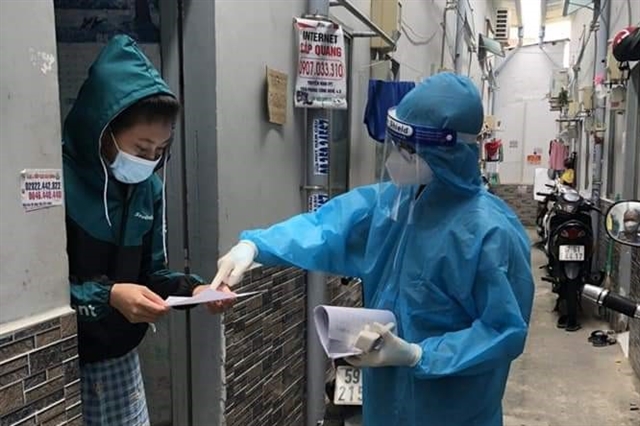 Society
Society


|
| A medical worker consults a COVID-19 patient who takes treatment at home. — Photo moh..gov.vn |
HÀ NỘI — Many people have been sharing prescription medicines that helped them recover from COVID-19 without consultation from professional medical workers, posing a danger to public health.
Doctors have raised concern over the issue, emphasising that no prescriptions work for all, while many antibiotics are not needed despite being widely promoted online.
Dr Nguyễn Huy Hoàng, Việt Nam-Russia Hyperbaric Oxygen Centre, said that almost every prescription spread online for COVID-19 cases contained antibiotics and that patients without bacterial infections did not need them.
"Currently, it is a fact that people share prescriptions with each other. When people see a prescription that works for themselves, they immediately consider it a 'standard prescription' to share," Hoàng said.
“Some people need many medicines to recover from COVID-19 while some don’t need any,” Hoàng said. "Many people overcome the illness with a few vitamin pills and fever reducers."
Facing difficulties in accessing medical facilities and staff, people infected with SARS-CoV-2 often search for treatment elsewhere without knowing that there are many incorrect prescriptions.
“Currently, antibiotics are being abused as almost every prescription contains antibiotics. Taking antibiotics is not good for patients without bacterial infections as the abuse causes toxicity to the liver and kidneys,” Hoàng said.
“Many antibiotics included in prescriptions cannot be used for children,” he said. "Using antibiotics without professional medical consultations can worsen antibiotic resistance, which is now a severe problem in Việt Nam."
About 95 per cent of COVID-19 infections in Việt Nam are currently treated at home, so it is crucial to provide precise official information on treatment.
“The treatment must be conveyed as simply as possible so that people can easily access, understand and follow it,” he said.
“Once people have limited access to official channels, they may apply an incorrect treatment regime, particularly unverified prescriptions spread on the internet,” he said.
Hoàng also warned about the negative impact of people not reporting COVID-19 infections to health authorities.
Many people have said that as their illness was not serious thanks to vaccinations, and hospitals being busy, they will not report their infections to authorities.
“People’s not declaring their COVID-19 infection could leave unpredictable consequences in spreading it,” Hoàng said.
“Their declarations could help local medical staff assess the pandemic and infection situation in the locality and alert other people to take preventive measures such as limiting contact.
"If people did not report immediately, the overall picture of infections is not accurate. This affects policy changes in management and coordination of supporting agencies, which may cause unnecessary consequences."
Hoàng said that the healthcare system in major localities was still able to deal with cases that required hospitalisation, except for children.
“It is necessary to increase communication on how to care for children infected with COVID-19 at home to reduce hospital workload and pressure,” he said.
The doctor said that parents with children getting COVID should keep calm, adding that it was possible to provide care at home or reach out on support channels like social networks or hotlines so that the children do not necessarily need to go to the hospitals.
Moreover, doctors with expertise in paediatrics should be available to offer assistance through the grassroots healthcare system.
At the same time, the Ministry of Health has specific guidelines for children up to five years old. — VNS





 Brandinfo
Brandinfo